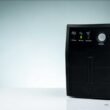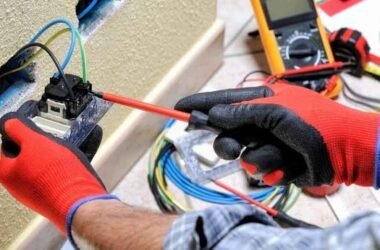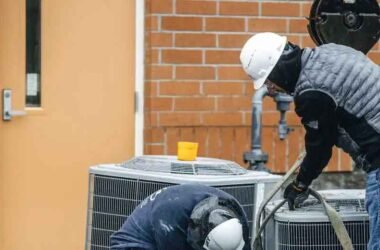Running a small business requires juggling many responsibilities, from managing staff to ensuring customer satisfaction. However, one often overlooked aspect is the reliability of plumbing and air conditioning systems. These two systems play a vital role in daily operations, whether it’s maintaining a comfortable indoor environment for customers or ensuring that restrooms, sinks, and appliances function smoothly for employees. Neglecting them can lead to costly downtime, unexpected repairs, and even potential health risks.
We will explore some practical tips that small business owners can use to maintain efficient plumbing and air conditioning systems, reduce operating costs, and create a healthier workplace environment. By implementing preventive measures and adopting smart maintenance practices inspired by services like those offered by Bruno Plumbing & Heating, businesses can prevent disruptions and maintain their facilities’ smooth operation throughout the year.
Practical Plumbing & AC Tips for Small Businesses
- Schedule Preventive Maintenance Regularly
Small businesses benefit greatly from regular maintenance of plumbing and AC systems. Preventive maintenance helps detect minor issues before they escalate into major disruptions. For plumbing, routine inspections can identify leaks, clogs, or worn-out parts in sinks, toilets, and water heaters. For air conditioning, maintenance checks keep coils, filters, and ducts clean, ensuring proper airflow and cooling efficiency. Preventive maintenance also extends the lifespan of equipment, saving money in the long run.
By creating a quarterly or semi-annual maintenance schedule, business owners can stay proactive instead of reacting to emergencies. Additionally, maintenance visits can help maintain records of system conditions, which is useful for budget planning and ensuring compliance with safety regulations. Overall, these regular checkups protect investments and provide peace of mind that essential systems are always reliable.
- Train Employees on Basic Awareness
Even with regular professional maintenance, employees play a key role in spotting potential plumbing and AC issues. Training staff to recognize early warning signs can save businesses time and money. For instance, employees should know how to identify unusual sounds from air conditioning units, inconsistent cooling in different rooms, or visible leaks near plumbing fixtures. They should also report slow-draining sinks, running toilets, or water stains on walls and ceilings promptly. This type of awareness enables problems to be addressed promptly before they escalate.
Additionally, staff can be trained to use equipment responsibly, such as avoiding the improper disposal of items and adjusting thermostats only when necessary. Creating a simple reporting system within the business ensures issues are logged and addressed promptly. A culture of awareness not only reduces risks but also fosters a sense of shared responsibility among team members in maintaining a safe and healthy workplace environment.
- Prioritize Energy Efficiency
Energy efficiency is a crucial concern for small businesses seeking to lower their operating costs. Plumbing and AC systems can account for a large portion of monthly utility bills if not managed carefully. For air conditioning, installing programmable thermostats allows businesses to regulate temperatures based on occupancy, reducing energy waste during off-hours. Upgrading to high-efficiency HVAC units or ensuring proper insulation around ductwork can also improve performance. On the plumbing side, using low-flow faucets, toilets, and aerators conserves water without sacrificing functionality.
Businesses can also consider tankless water heaters, which heat water only on demand, thereby avoiding the constant energy consumption of traditional tanks. Small upgrades like these reduce expenses and contribute to environmentally friendly practices that many customers value. Over time, energy-efficient practices not only lower costs but also enhance the business’s reputation as a responsible and forward-thinking operation.
- Address Air Quality and Water Quality
Beyond functionality, the quality of air and water inside a business impacts health and customer experience. Poor air quality can result from dirty AC filters, mold growth in ducts, or inadequate ventilation. These issues may lead to discomfort for employees and clients, or even health-related complaints. Changing filters monthly and ensuring ducts are inspected for buildup helps maintain clean indoor air. Similarly, water quality is just as important.
Contaminated or hard water can damage plumbing systems, appliances, and even affect the taste of water served in restaurants or cafes. Installing water filtration systems not only protects plumbing but also enhances the overall customer experience. Businesses like gyms, spas, and salons especially benefit from paying attention to water quality. Addressing these aspects demonstrates that the business prioritizes the well-being of its patrons and staff, thereby contributing to a healthier and more welcoming environment.
- Plan for Emergencies and Downtime
Even with the most careful maintenance, unexpected issues can still arise. Small businesses should prepare for potential plumbing or AC emergencies to minimize disruptions. Developing an emergency plan ensures that employees know the steps to take in the event of a major leak, pipe burst, or AC failure. This includes shutting off main water valves, knowing the location of circuit breakers, and having contact information for reliable service providers readily available. Some businesses may even choose to keep backup equipment, such as portable AC units or water shutoff tools, on-site for quick responses.
Planning for downtime also involves setting aside a budget for unexpected repairs and communicating contingency plans to staff. While emergencies cannot always be avoided, preparation reduces the severity of their impact. Having a clear plan reassures both employees and customers that the business is capable of handling challenges without major disruptions.
Small businesses thrive when their operations run smoothly, and reliable plumbing and air conditioning systems are crucial to achieving this goal. By focusing on preventive maintenance, employee awareness, energy efficiency, and air and water quality, businesses can reduce risks of disruption and create a healthier workplace. Preparing for emergencies, monitoring seasonal demands, and investing in long-term upgrades add layers of protection that safeguard both the business’s financial health and its reputation. Paying attention to these details allows small businesses to provide a consistent, comfortable, and safe environment for everyone who walks through their doors.









